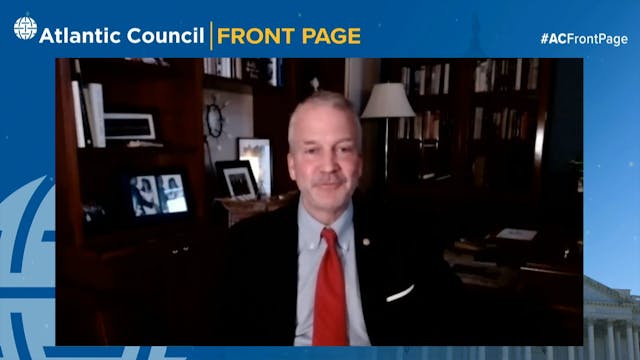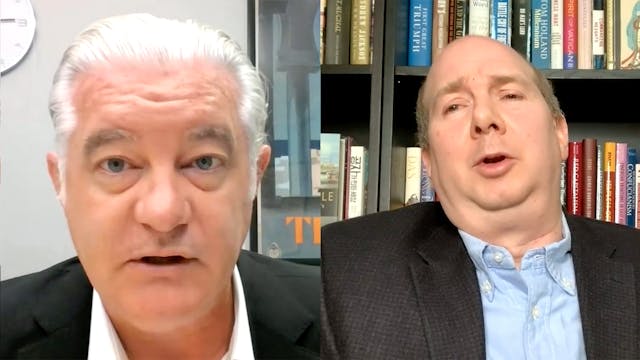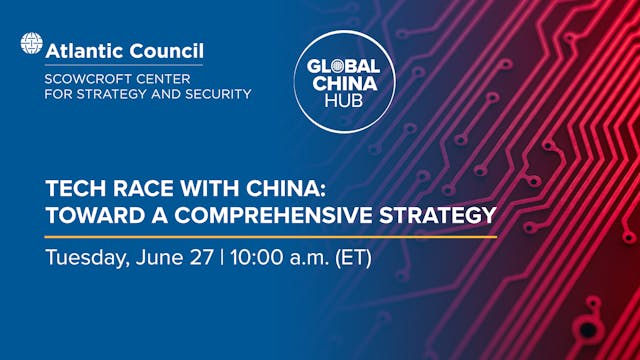Prime Minister of Estonia H.E. Kaja Kallas on digital infrastructure and China
China
•
14-Jul-2021
TRUSTED CONNECTIVITY: SECURING DIGITAL INFRASTRUCTURE IN AN ERA OF STRATEGIC COMPETITION WITH CHINA - The Atlantic Council hosted the second event in our forum “Trusted Connectivity: Securing Digital Infrastructure in an Era of Strategic Competition with China,” featuring the Prime Minister of Estonia H.E. Kaja Kallas, Representative Ro Khanna (D-CA 17th District), and NSC Senior Director for International Economics and Competitiveness Peter Harrell. This event, co-hosted by the Scowcroft Center for Strategy and Security and its Forward Defense practice area, the Digital Forensic Research Lab, the Europe Center, the GeoEconomics Center, and the GeoTech Center, took place on July 14, 2021.
In an era defined by both revolutionary technological advancements and accelerating geopolitical competition, modernizing global infrastructure is not only a profound economic opportunity but also a key security imperative. Our June 2021 #ACFrontPage event, featuring President of Estonia H.E. Kersti Kaljulaid and US Deputy National Security Advisor for Cyber and Emerging Technology Anne Neuberger, introduced the concept of “trusted connectivity” as a strategic framework for democratic nations to incentivize ambitious and interconnected infrastructure projects among the private sector, and to provide a viable alternative to authoritarian efforts like China’s exploitative Belt and Road Initiative. Yet there remain significant hurdles to implementing this framework. Technological and legal standards, industries and the products they develop, and visions for the future of economic vitality, societal resilience, and national security are not aligned among many democratic nations. If trusted connectivity is to serve as a key pillar alongside existing US and allied initiatives like Build Back Better World, the Blue Dot Network, and the US Innovation and Competition Act, the United States and its allies and partners need to overcome these obstacles along the path to trusted global infrastructure.
In advance of the Tallinn Digital Summit this September, Prime Minister of Estonia H.E. Kaja Kallas joined the Atlantic Council to discuss how the United States, European nations, and their respective industries should collaborate through policy, law, and market forces to build trusted connectivity into their emerging digital and physical infrastructure, using the Three Seas Initiative as a foundational example. Prime Minister Kallas was joined by Representative Ro Khanna, who shared how the imperative to invest in secure digital and physical infrastructure relates to key legislative initiatives like the US Innovation and Competition Act, and NSC Senior Director for International Economics and Competitiveness Peter Harrell, who addressed the nexus of economics, security, and statecraft and explored how democratic governments can better incentivize the private sector to invest in ambitious infrastructure projects, especially in the face of a Chinese system that allows its government to heavily influence its companies.
ORIGINAL AIRDATE: 07/14/21
Up Next in China
-
US Senator Dan Sullivan on US strateg...
A CONVERSATION WITH US SENATOR DAN SULLIVAN - China is the foremost geopolitical competitor to the United States since the Soviet Union. It presents a challenge across the domains of trade, technology, governance, and security. The Atlantic Council has been at the forefront of developing strategi...
-
China's blueprint for the new world o...
CHINA'S BLUEPRINT FOR THE NEW WORLD ORDER
The Atlantic Council’s Global China Hub is pleased to host the launch of a new report, “Global Development Initiative and Global Security Initiative: China’s blueprint for the new world order”, authored by nonresident senior fellows Michael Schuman and J...
-
Strategy on winning the tech race wit...
TECH RACE WITH CHINA: TOWARD A COMPREHENSIVE STRATEGY - The United States has been the world’s technology leader since the end of World War II, and its innovation edge has provided substantial economic, geopolitical, and military advantages for decades. As we enter a contested period of great-pow...



